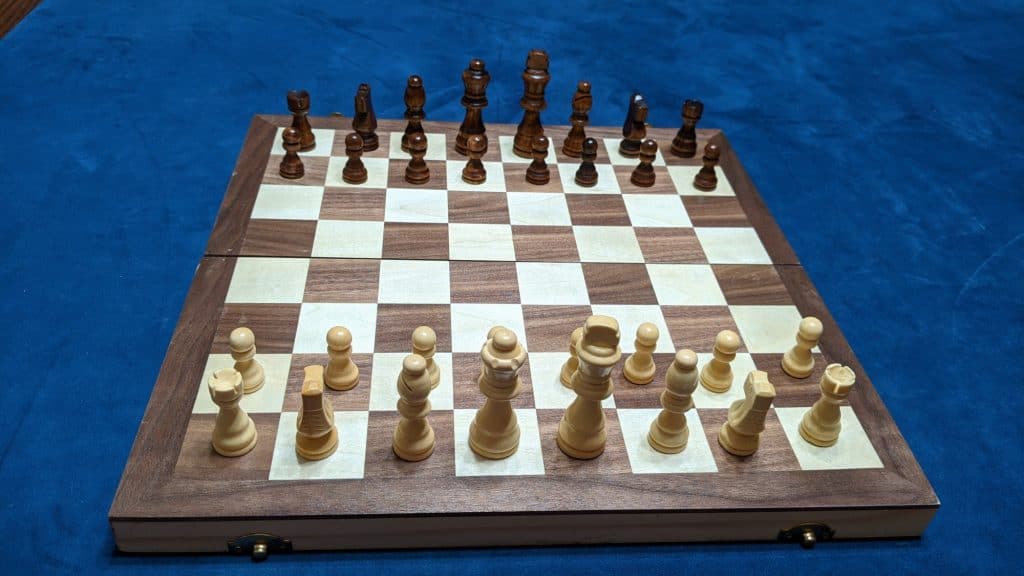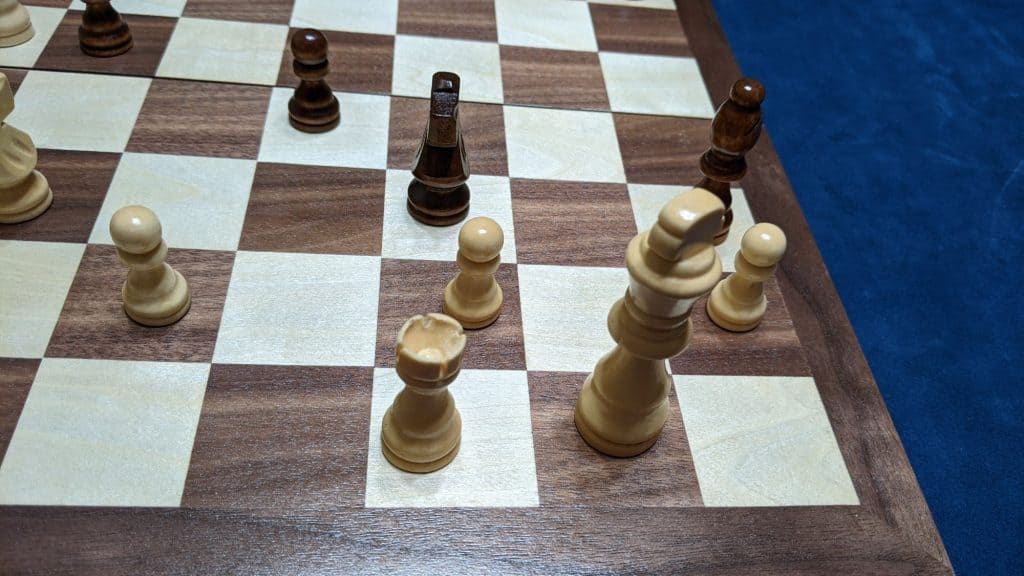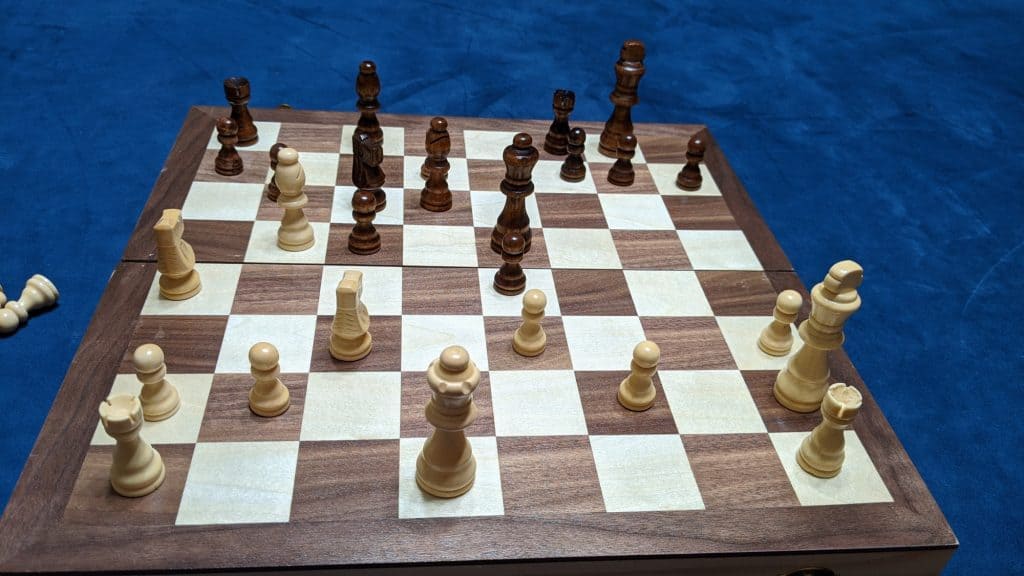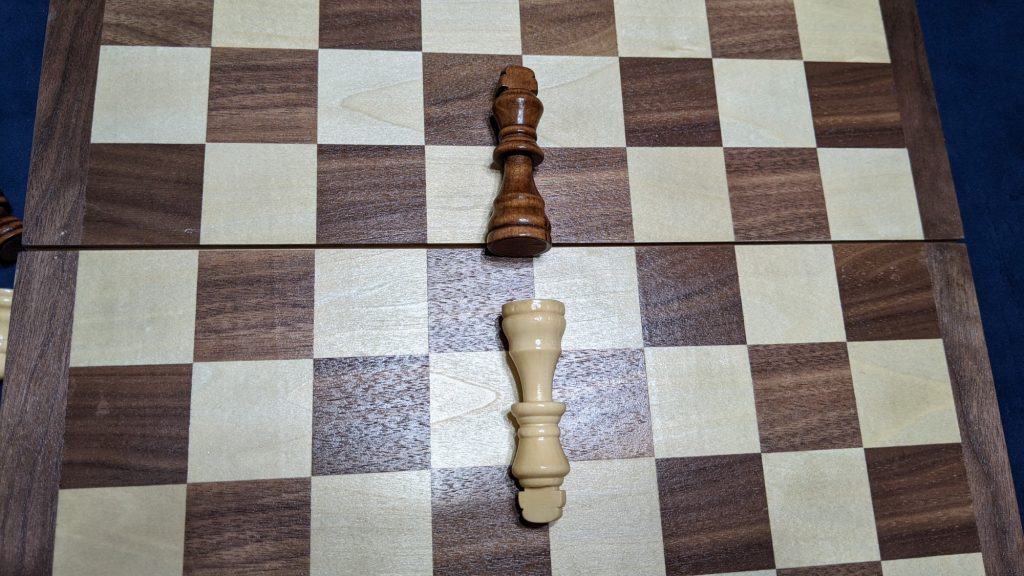The idea that chess is a “solvable” game was odd to me the first time I heard it. While I’m far from a grandmaster, I’ve always been an avid chess player. Helped create a chess club at my high school 25 years ago that still exists to this day, and was one of the better players at, admittedly, a very small high school and small private college. While the limited space of the board and rules of movements definitely lead to things like clear opening movements, or eliminated many random on-board movements that weren’t good strategy, the idea that chess could be “solved” was something I hadn’t considered until relatively recently.
Chess is not yet a solved game. As a whole strong chess players agree that while mathematically there are finite moves and combinations, the styles, strategy, and skill levels of players means there are infinite ways a game can play out. There is no one best set of moves to win in all situations, so chess is not “solved” although there’s a possibility that one day it could be.
But if this is the case then what are chess players talking about when they “force moves” or there’s an “only move?”
Those are the types of deep dive questions that bring so many of us into the world of chess, and thanks to some awesome outreach from Braden, we also have two highly rated (much, much better players than me) to pick their brains about this very topic!

Best Moves, Forced Moves, Only Moves in Chess
There are certain parts of a chess game that tend to be heavily dictated. When you’re just beginning with chess you tend to learn the same four basic moves (pawn, knight, knight, bishop) until you learn enough about the game and strategy to try other things. Even then, it’s a good opening combination that gets important pieces out and gives you plenty of options.
But there’s nothing making that opening mandatory.
There are times where new players may hear phrases like “He controlled my moves,” or “I was basically just reacting the whole game.” While it is true that a game can get out of hand for a player to the point where the other is dictating action – this is almost due to a variety of earlier mistakes, major talent differences between the two players, a mistake, or a combination of all of those factors coming together.
There is no “If you start with these 10 moves your opponent MUST do these moves to survive” scenario, though. These situations only occur because of the gameplay that happened leading up to those points.
Forced Chess Moves
Some games of chess can seem very “solved” or pre-determined because a player is making reactionary moves. Sometimes several in a row. This is what happens when a player usually says they were forced to make a series of moves. Or a quote from my friend Luke: “I knew I was in trouble when you forced my move six times in a row.”
A forced move is a situation where clearly there is only one good move. This could be an “only move” where there’s only one legal move on the board to get out of check, or it can be a move where not doing that move means losing an important piece like a rook or queen and gaining nothing, or too little, in return.
But forced chess moves tend to be a relatively small percentage of moves in any given game. In addition to this, you can always choose to make the not right move, although that does tend to lead to defeat. Whether that makes a situation solved or not is up for debate but those sequences certainly follow a very narrow and dictated moves.
But these types of sequences don’t occur in every game and they are hardly inevitable.
Chess Only Moves
These are the most extreme of “forced moves” where the move isn’t just clearly the best option, but sometimes the only option that a player has. If there’s only one way out of check, that’s the move.

This is a situation where the king is clearly in check, there’s no way to take the attacking piece or block it, and there is only one clear space the king can move to in order to keep the game going just a little bit longer.
So for a single turn the right move in chess is very clear: the move that continues the game.
But many, many games take place without one of these moves taking place.
Pieces of a particular game being solved don’t mean the game as a whole is “solved.”
Best Chess Moves
There are times where there are clear best moves. There’s a lot going on here and for an amateur player, the instinct for white is to move the king to the side or even move likely, back diagonally. But is that really the best move?
I’d suggest pawn f2 to f4 to directly threaten the queen is a better move. It blocks the attack on white’s king and directly threatens black’s most powerful piece with a guarded pawn.
For experienced chess players, this move probably jumps out as a great option. For true beginners just learning the game, the first time spotting something like that can be an A-Ha moment of just how many options there are even in situations that might appear basic or forced at first glance.
Are chess games often dictated by a series of best moves? Sure that’s possible – but the reaction of the other player, what strategies they choose to employ, and how each player’s strategy clashes against the other’s all change what the best moves are. What may seem like move by move decisions are actually changing and altering entire series’ of moves and decisions to come.

Are All Expert Games Just Shifting Pre-Determined Patterns?
No, though to those of us who can’t analyze 12 moves and counter-moves ahead it can sometimes seem that way. The absolute masters of chess can think more moves ahead, know the classic strategies (and counters to them) and so the game is a constant shifting of strategies and board position as they jockey for an edge in advantage or control over the opponent and try to build on that to victory.
Are there well-known best play sequences? Absolutely.
Especially when it comes to end game scenarios. There are also plenty of “brute force” scenarios where the piece differential calls for a general strategy that will give a player the end game advantage most of the time.
Attempting to counter these sequences often calls for similar moves or strategies.
But each move still has to be made, countered, and each threat responded to. So while, especially with the top players in the world, many sequences and potential attacks are well known, as are the counters. During these moves there are hundreds of potential moves that would be considered mistakes – so they’re not made.
This can make games feel solved. The very high number of draws versus win/loss end game scenarios among grandmasters today shows that there is a point where the options go from seemingly infinite to very finite.
Whether that’s a problem, a sign chess is getting closer and closer to actually being solved, or simply a logical conclusion to perfectly played games based on the likely outcome of such scenarios is something still up for debate.
Thoughts from Two Chess Experts
The amazing responses we received from Timothy Harrington-Taber and Justin Kleist have been included in full below. While the information was huge in helping to mold, shape, and further inform my our opinions on this question of chess, both responses were also so good it didn’t make sense to cut any of the information out.
So aside from some formatting to make the answers look nice and add some emphasis, these are their full answers/thoughts on the topic of whether or not chess is a solved game. And whether or not it could become one.
Two great points of views, and once again a HUGE thanks to both of you for your responses, thoughts, and expertise on the matter!
Featured Chess Expert #1: Timothy Harrington-Taber, with a USCF Class A rating (1955 Standard)
From an e-mail response on the question of whether or not chess is a solved game and his thoughts on the topic.
Some positions have relatively few “good” moves. These are called “forcing” positions (if there is only one good move, it’s called an “only move”). In many positions, more than one plan might merit consideration, with more than one way of going about it.
Usually, the eventual result of the game is clear several moves in advance (or at least, one player may have a clear advantage). I had one tournament game where I literally did not come up with any of my own moves. I simply played out a sequence that I knew to checkmate (about 14 moves) and my opponent didn’t.
There’s a lovely quotation from Savielly Tartakower, a famous chess player, that a chess game has three stages: The part where you hope that you have an advantage, the part where you think that you have the advantage, and the part “when you know that you’re going to lose.”
I think that the progress made in computer algorithms (with neural network self-learning strategies) indicates that there is significant progress being made at understanding the game.
I would not say that chess is solved, because that would imply that the best move in any given position is clearly known, which does not appear to be the case.
There are some positions that are completely solved (endgame table bases, where the optimal sequence of moves to checkmate has been brute-forced, as long as there are few enough pieces on the board).
In chess, I like the ability to choose between different active plans. Different openings will lead to different patterns and promote the use of particular ideas.
For instance, some openings lend themselves directly to attacks on the hostile king, while others suggest a plan of creating a weak pawn and using that weakness to reach a winning endgame.
I hadn’t heard of any groups claiming that chess was a “solved” game before you brought it up. Computers have been clearly stronger at playing chess than even the best humans for the last 15 years, but I believe that the game is far from solved.
Timothy Harrington-Taber
Featured Chess Expert #2: Justin Kleist, Rated 2087 USCF (Expert Level according to USCF Guidelines)
From an e-mail response on the question of whether or not chess is a solved game and his thoughts on the topic.
Not sure if I’m who you’re looking for to answer these chess questions but I’ll give it a shot.
I’m rated 2087 USCF, which I believe is expert level although National Master (2200) is typically the lowest recognized title.
Within any given game there’s quite a bit of freedom in move choice. There’s tons of different openings for white and black to play and oftentimes in a given position there are quite a few different good moves based on a variety of ideas in the position rather than one specific best move or strategy.
This can vary and sometimes tactical or sharp positions can be more demanding, but in general I feel that players have many different options rather than being forced to play a certain way.
Players generally have a good sense of whether a position is good or bad for them. On a basic level this would be the difference in material between them and their opponent, but positional factors also play an important part.
Having less space, weak squares/pawns, or open king often spells danger and in better positions it’s often easy to find good moves or ideas whereas in worse positions it’s often difficult to find moves as you get stuck defending.
Players generally see a few moves ahead which helps them gauge the position but it often times isn’t as much of a decisive turn of events in a couple moves rather than getting worn down throughout the game as one of the players gains a larger and larger advantage.
The best example I can think of was when I was playing a National Master I had played a couple of times before. I knew which opening he typically played and looked it over with an engine before the match. I saw an idea which made it difficult for him to find the right moves to correctly defend, so when he didn’t find the best move in a sharp position I knew I was much better and likely going to win.
My strategy worked perfectly and I won the game rather quickly. Of course it hardly ever goes according to plan but that was one of the times I was incredibly lucky to foresee a winning position before the game even started and have it play out similarly.
Chess isn’t a fully solved game. There isn’t necessarily always one best first move or continuation and given the vast number different moves and possibilities throughout a game no computer has been able to completely solve it given best play by both players.
However, computers are getting better and better at evaluating positions and calculating moves and often help dictate what moves a player makes.
There are quite a few opening options available to white and black but at the top level the theory for some of these opening lines can go twenty or more moves deep.
Opening preparation has become an increasingly critical part of grandmaster play as they use engines to evaluate and find novel lines in this theory that they can use to their advantage.
The opening lines that grandmasters play is now much more standard than the pre-computer era and the theory has rapidly evolved with engine analysis.
Furthermore, the level of play of top grandmasters has improved and more and more games between these very high level players are ending in draws (which is often considered a big issue in chess today). With that breadth of knowledge chess can sometimes feel solved, but despite the fact that it is much less likely to find a game changing idea or strategy than previously, there remains quite a bit of creativity in chess and grandmaster play.
Justin Kleist
I remember this theory sometimes being incredibly discouraging when I was actively studying chess because it felt like for every opening like there were very specific best moves to play while all other could be considered inaccurate or lead to worse positions.
However, I think the focus on opening preparation is sometimes overstated for untitled players or those below the top level because oftentimes opponents won’t follow preparation and it’s more important to understand ideas behind the openings rather than specific moves. It’s difficult to memorize too many moves and ones opponent will rarely play exactly like a computer.
At some point all games must leave “theory” and from there the possibilities are endless. I think chess will eventually become a solved game because at some point there are only a finite number of possibilities, and it is moving in that direction, but in its current state there are too many possible outcomes to consider it solved.
And chess may remain interesting after it is theoretically solved as the amount of memorization and understanding to prove an advantage or hold a draw given a number of different moves may prove extremely difficult, at the very least below the top levels.
Chess continues to evolve as well, one example being the increasing popularity of Fischer Random chess where pieces are randomly arranged (but still symmetrically for white and black) on the first and eighth rank leading to a multitude of different starting positions and from there more unique or unseen positions and ideas.
Chess is great because of how different each game can be. One game can be slow and positional where one adversary quietly builds an advantage and takes thirty move or more to prove it, while others can be incredibly sharp where the margin between finding the right move and making an intricate mistake is small and the difference between winning and losing.
And it’s not always about playing. You can look over the games of grandmasters or other players and see their ideas unfold or be wowed by their brilliancies.
It may seem like just a simple game governed by the way the pieces move, but there is always more to learn or understand and the sheer breadth of knowledge along with the uniqueness of each game is fascinating.
AI Chess Player Vs Human Chess Player
One big source of this “Is chess solved?” controversy seems to come right at the feet of the AI chess playing robots. And a possible direct quote from the IBM development team proclaiming “Chess is solved,” although in fairness, while there have been second hand reports of this quote I haven’t been able to verify it. And their interest is marketing their tech, so it’s hardly fair to hold them to a technical expert level.
Are we at the point where a top of the line AI chess computer will ALWAYS beat a human chess player?
Yes. We’ve been past that point for about a decade now. Even the all-time great chess players would almost certainly not stand a chance at the best AI chess computers out there right now.
When there’s a game where rules or a confined board leads to a limited number of potential moves then an AI is going to be infinitely more capable of finding every potential sequence or end game versus even the best human minds in the world. In using chess as a way to test AI vs humans it is definitely a stacked deck against people.
And for the IBM AI team it is great marketing to proclaim they solved a game that is over 1500 years old before the best players in the world could. Is it really a solved game at that point, or a program designed to be more efficient than the human mind?
Again, something that could be debated but at this point no one looking objectively at the situation is going to argue that human chess players have a shot against an AI designed to play chess at a master level.
The Questions We Have to Ask
In any discussion like this there are going to be related questions that really fill in some side questions to form you own opinion on the question of chess vis a vie being solved or still being open with more to discover.
Is There a Perfect Game in Chess?
In theory yes, in reality…maybe? The problem with defining a perfect game is what does that mean? If there was an unbeatable set of moves that guaranteed victory regardless of outcome then this article would be pointless because the answer would be yes.
But from my point of view there can be. There was a game once where I clearly dictated the pace. There was a six or seven move sequence where we both knew what his move was based on my aggressive attack. By the end of that sequence I controlled 2/3 of the board, snagged a couple of his pawns, and had both my knights and bishops out and able to attack aggressively across the board.
We played it out, but it was crystal clear to both of us that unless I screwed up big time, the game was mine, we were just playing it out. To me that was a perfect game.
If I listed all the moves here, I’m sure someone better at chess would call it amateurish and point out a counter-offensive the other player could have done to stop me in my tracks.
But that’s the beauty of chess. I can play a game I remember as perfect when I was in high school. Then another one where I was a better player in college. Then that last game. Each player can have their moments where they just hone in and play a game that seems to flow flawlessly for what they’re trying to do.
In that sense, yes, there are definitely perfect games in chess and they feel amazing. But in the true technical and literal definition, probably not.
Is Chess AI Unbeatable?
At this point, yes. A human player is not going to be able to beat a fully developed chess AI. Would two chess AIs always draw? No idea. Be kind of interesting to see, though.
Will Chess Ever Be Solved? Can It Be?
That’s the million dollar question. There might be a point where almost every advanced game among world class players that doesn’t have a mistake ends in a draw. While there are a lot of draws now, that is not a foregone conclusion as a result. Once it is, if we get to that place, I don’t think it would be remiss to call chess a solved game for all practical purposes.
Others might disagree.
A mathematical study of chess done by Southeastern University dives into some of the numbers and math if you want to do more of a deep dive on it.
How Limited Are “Good Moves” in Chess
This is a loaded question because any given move needs to be taken in the context of the pieces on the board, that particular game, the players who are playing, and the strategies being employed by both sides. Giving up a bishop or knight for a pawn might seem stupid, but if it gets a problem piece out of the way so you can force a checkmate, then it turns out it was a great move.

Verdict: Is Chess A Solved Game?
My gut instinct when I ran across this question for the first time was no. And while thinking about it more has added a lot of caveats, additional thoughts, and deeper reflection, I’d still stand by that. Is chess a solved game? No, at this point it isn’t.
Could chess become a solved game?
While originally I would have said no, after thinking on this more, reading other opinions, looking at recent games between world class players, and getting the excellent email responses from Braden’s friends, who are both clearly better players than I am and have the rankings to prove it, I think maybe it might be someday.
There might be a point where are all the best sequences are figured out to the point where any mistake-free game ends in a draw. But even if that does happen, and that’s still a big IF, that makes it solved for the handful of the best players in the world.
For the rest of us chess players who love the game there will always be more to try out, always more to discover, always more to find. And that’s something I find incredibly wonderful about one of my all time favorite games.
Other Board Game Articles You May Like:
- What Is an Illegal Move in Chess?
- Illegal Castles: Chess Picture Guide
- Can a King Kill a King in Chess?

Proud to embrace the locally created moniker of “Corrupt Overlord” from one of the all time great Lords of Waterdeep runs, Shane is one member of the Assorted Meeples crew and will be hard at work creating awesome content for the website. He is a long-time player of board games, one time semi-professional poker player, and tends to run to the quirky or RPG side of things when it comes to playing video games. He loves tabletop roleplaying systems like Dungeons & Dragons, Pathfinder, Werewolf, Fate, and others, and not only has been a player but has run games as DM for years. You can find his other work in publications like Level Skip or Hobby Lark.
